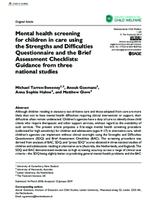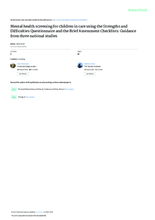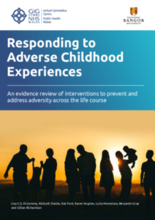Displaying 161 - 170 of 525
The objective of this study was to test the associations between parent-child separation with telomere length (TL) and psychopathology during adolescence.
The present article proposes a first-stage mental health screening procedure (calibrated for high sensitivity) for children and adolescents (ages 4–17) in alternative care, which children’s agencies can implement without clinical oversight using the Strengths and Difficulties Questionnaire (SDQ) and Brief Assessment Checklists (BAC).
The present article proposes a first-stage mental health screening procedure (calibrated for high sensitivity) for children and adolescents (ages 4–17) in alternative care, which children’s agencies can implement without clinical oversight using the Strengths and Difficulties Questionnaire (SDQ) and Brief Assessment Checklists (BAC).
In this paper, the authors advance a framework for examining the nature and consequences of neglect, which they posit can be represented as variations along a continuum from severe psychosocial neglect to environmental enrichment.
This paper outlines a psychological skills group for unaccompanied asylum-seeking young people with a focus on cultural adaptations in the context of a UK mental health service.
This study compared adolescents in residential care (RC) in Portugal, with a Portuguese community sample on the incidence of mental health problems and psychosocial skills, explored gender differences and the relationships between mental health problems and psychosocial competencies.
The aims of this study were to systematically evaluate and comparatively analyse the mental health status of left‐behind children (LBC) in China and to provide a scientific basis for mental intervention and healthy education for LBC.
The main objective of this study is to explore, from a bottom-up perspective, the moderating effect of an experienced happiness indicator (OHS) and the daily-life activities shared between caregivers and adolescents in the residential care system in Peru.
This article provides an overview of typical experiences for unaccompanied immigrant minors (UIMs), discusses the accompanying legal and clinical implications, and offers recommendations for psychological practice at the level of providers, training programs, and child-serving systems.
To support innovation in addressing adverse childhood experiences (ACEs), the authors have undertaken a review of evidence on common approaches to prevent ACEs and/or mitigate their negative impacts in Wales.



